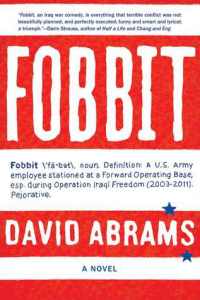
Published by Grove Press/Black Cat on September 4, 2012
All wars are fought, in significant part, on the propaganda front. As warfare has become more sophisticated, so has news management. Fobbit (the term infantry grunts apply to soldiers who never leave the relative safety of the Forward Operating Base in Baghdad) ably captures the military's attempt to manage the news during the American occupation of Iraq.
Assigned to Public Affairs, Staff Sergeant Chance Gooding Jr. is doing his best to spin the war, a task made more difficult by officers like Capt. Abe Shrinkle, who blows up an American military fuel tanker with a hand grenade, killing a civilian Iraqi bystander in the process. As Gooding tries to prepare timely press releases, he is consistently beaten to the punch by CNN reporters who manage to compile a more accurate and complete story while Gooding's meddlesome superiors insert phrases like "enemies of democracy," debate the merits of referring to insurgents as "terrorists," and fret over the placement of favored adjectives like "heinous" and "brave." There is no bad news to report (at least according to the memos Gooding receives), a distortion of reality that challenges Gooding to recast disaster as triumph.
Despite its inevitable comparison to Catch-22, Fobbit isn't as split-a-gut funny, nor does it illustrate the folly of war as well as Heller's novel. David Abrams is a capable writer but his humor is often forced and he lacks Heller's literary flair. Abrams tips his hat to Heller when Gooding, reading Catch-22 on R&R, describes Heller's novel as "an owner's manual for this war." Shirkle, on the other hand, believes (in accordance with the views of his West Point professor) that Catch-22 is unpatriotic because Yossarian spends much of his time trying not to die for his country.
Unlike Catch-22, I sometimes felt that Fobbit consisted of a collection of characters in search of a plot. As a penetrating examination of the military's attempt to manage the news during the occupation of Iraq, Fobbit is a success. As cohesive comedy, Fobbit is far from perfect. The humor largely derives from two harmonic notes: the illusory attempt to control the news and the uniform incompetence of commissioned officers. When Abrams strays from those themes -- when, for instance, an officer sends self-aggrandizing emails to his mother -- the humor feels strained. While Abrams sets credible scenes within the Forward Operating Base and on occasional forays into Baghdad and Qatar, Fobbit rarely creates a visceral sense of men at war. Images of death and destruction lack power. Shirkle's transformation from flag-waving patriot to anti-military slacker is unconvincing. The novel's ending is more of a fade-out than a decisive conclusion, although I suppose that also describes the war itself.
Fobbit is an enjoyable novel despite its flaws. Abrams has a talent for spotting fools and for replicating their foolishness in his characters. He has a unique take on the war and on the public affairs writers charged with concealing the truth. When the novel focuses on propaganda management, it works well. Fobbit is worth reading for those golden moments.
RECOMMENDED